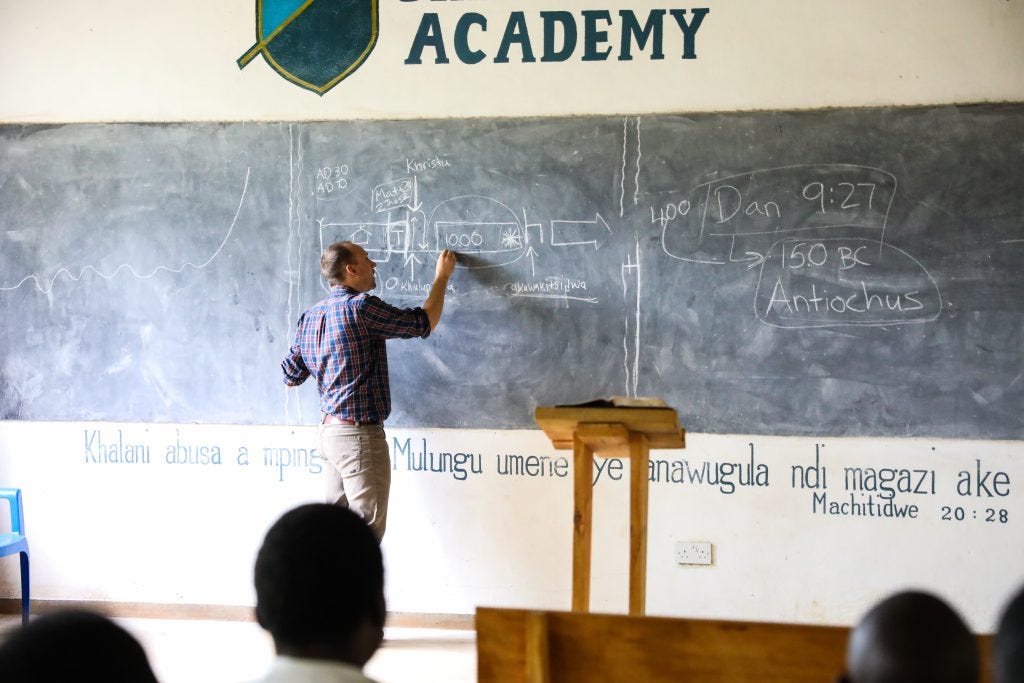The Problem of Pastor Training and Money
How we unintentionally fuel the fire of the prosperity gospel
Several Malawians have said to me, “Every Malawian wants to be a pastor because he wants to be rich.” I’ve found this to be only a slight exaggeration. Prosperity preachers with their colorful suits and their faces plastered on billboards announcing the next healing campaign are the role models that many look up to. They offer a vision of getting rich, quick and easy.
Many of my fellow evangelicals see the prosperity gospel for what it is — a Satanic perversion of the gospel and an attack of Christ’s churches. One of the results of this attack is that too many African pastors (and the same is true globally to one degree or another) aren’t serving for Christ but serving for money.
Unfortunately, some of those involved in pastor training, who teach strongly against the prosperity gospel, unintentionally reinforce this “ministry for money” mentality by paying pastors salaries, building them houses, giving them bags of corn, or other benefits. For those coming from North America or Europe, this feels right because it helps a poor pastor to focus more on ministry and not worry constantly about his family’s physical needs, but on the ground, it adds fuel to the prosperity gospel fire that is raging across Africa.
One type of gift that counter-intuitively fuels the fire is paying for someone’s transportation to a pastor training. Some organizations will give to each pastor that attends their trainings what to us is a small amount of money (like $10/pastor) to help pastors pay for the public transportation or fuel to travel back and forth to their training event. On the one hand, this feels good and right. No one wants pastors struggling or their families to go without for him to learn the Bible, right? Nevertheless, this deepens the “money for ministry” problem.
We see the same problem in secular NGOs. Many NGOs who teach things like permaculture to help improve farming yields for villagers will pay people to attend their trainings. What’s the result? Villagers attend the trainings, get their payday, and never actually enact the methods they learned at the training. The bottom line is that they didn’t want to learn new methods of farming. They only wanted the money, and they jumped through the NGO’s hoops to get it.
The same type of mentality pervades pastor training put on by missions organizations as well. Pastors come to the training to get paid. Even if the payday is only a $10 supplement for travel expenses, they will figure out a way to travel on $5 and keep $5 in their pocket. All they have to do is sit through the organization’s teaching for a few days. While the organization believes the pastors are going home with greater knowledge of Scripture and sound doctrine, they actually haven’t paid much attention to the teaching. In reality, they are going home confirmed in their belief that being a pastor is a way to make money.
This is why my predecessor in Malawi decided several years ago not to give pastors money for attending our pastor trainings, and that is a policy I continue today. At our trainings last year, we had about 160 pastors. If I wanted 500 or 5,000 pastors, I could have them easily. I’d only have to do two things:
Accept anyone and everyone who wants to come, not just the Baptist churches that our organization has planted, but the countless pentecostal and prosperity churches on every corner.
Give them a transportation stipend for coming.
Can you imagine the prayer updates that I could write? “Last week, we taught biblical doctrine to 500 pastors!” Supporters would like that. But I can’t in good conscience do that, because I know I wouldn’t actually be making a real impact. 480 of those pastors would be there for the wrong reason.
At almost every modular training we do, I have an old pastor stand up and ask me, “Will you assist us with transportation to get here? It is difficult for us to find the money.” And every time, I say no. I don’t enjoy saying no over and over again, but I know that if men are willing to sacrifice to come to our trainings, then they are more likely to be there for the right reason — because they want to learn God’s word.
Every year, we lose pastors and churches because of our stance on material benefits. Just a couple of months ago, I heard that 3 churches had decided to work with another mission because they weren’t getting enough support from us. What they meant was that they weren’t getting enough material benefits. (We do help churches with Bibles, song books, metal roofs for buildings they've built themselves, as well as our medical clinics and disaster relief, but we don't pay pastors.)
When I hear reports like this, I’m not discouraged. This is a purifying process. By not fueling the fire of “money for ministry,” we are purifying the group of men that we are investing in. The men who stay are staying because they want to learn God’s word and serve him.
I’d rather invest more deeply in 11 men who are open to obeying God’s word than invest superficially in 500 men who are only jumping through a hoop to get something.
There was a time that Jesus fed the multitude, but there was also a time that Jesus told them no. Everyone left him, and Jesus turned to the 12 and asked, “You don’t want to go away too, do you?” Peter said, “Lord, to whom will we go? You have the words of eternal life. We have come to believe and know that you are the Holy One of God” (John 6:67–69). We want to develop this same commitment to Christ in the men we disciple.



